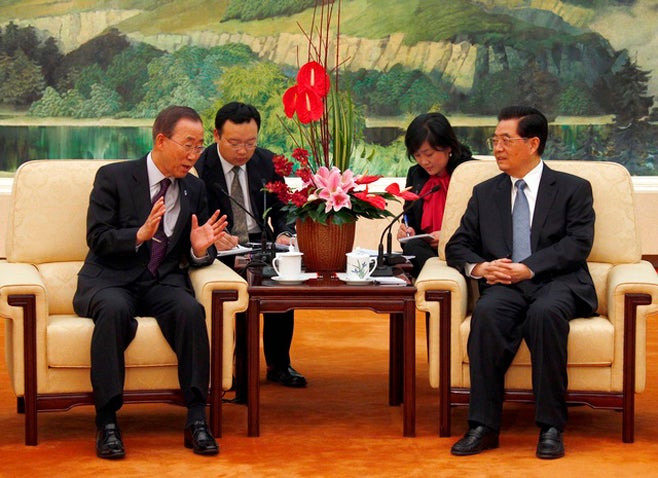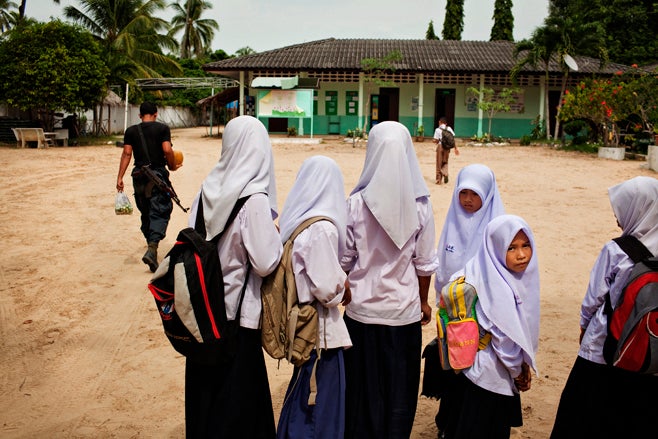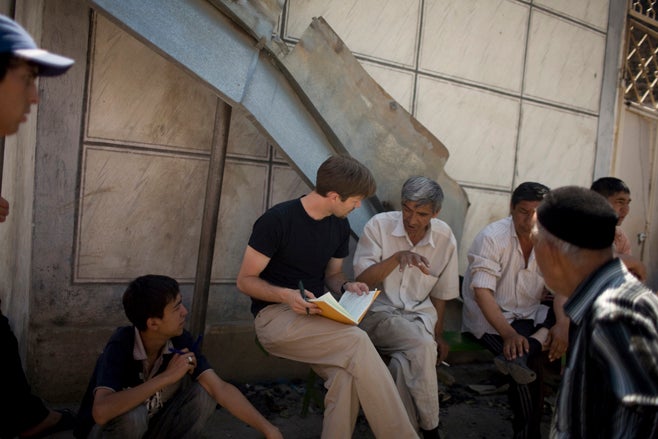By any measure, the unelected government of President Isayas Afewerki is oppressive. It allows no space for individual autonomy in any sphere-political, economic, or religious. Arbitrary arrests, torture, and forced labor are rampant. Rule by fiat is the norm. The Eritrean government refuses to implement a constitution approved in 1997 containing civil and human rights provisions. Many Eritreans conclude that they can avoid oppression only by fleeing the country at risk to their lives.
Arbitrary Detention, "Enforced Disappearances," and Deaths in Custody
Thousands of Eritreans are incarcerated without charge, trial, or opportunity to appeal. They are denied access to lawyers or family. The government releases no information about numbers of prisoners, their places of confinement, whether they remain alive, or why they are being held. Many detainees simply "disappear."
Prisoners include high-ranking government officials arrested in September 2001 after they publicly criticized President Isayas's leadership, as well as editors and publishers of all private newspapers. None have been charged or brought to trial. There have been persistent reports from former prison guards that over half the officials and journalists arrested in 2001 are dead. Among those still held is a journalist with dual Eritrean-Swedish citizenship, Dawit Isaac. In 2010 President Isayas's principal political advisor told Swedish interviewers the journalist was jailed for conspiring to "facilitate" an Ethiopian invasion of Eritrea during the 1998-2000 war. The advisor refused to provide substantiation and reiterated the "conspirators" would never be brought to trial or released.
Despite government secrecy, information about arrests leaks out. In May and June 2010 the government arrested several hundred citizens, most belonging to the Afar ethnic group, according to external opposition websites. (An Afar insurgent group has been active along Eritrea's southeast Red Sea coast). About 30 women members of an "unregistered" Christian church were arrested in December 2009. Although members of such churches are frequently arrested, Eritrea's information minister said that "religion had nothing to do with" their arrests. "I'm sure they were committing a crime," he added. Their crime has never been disclosed. A prominent former government journalist was arrested in March 2010 with no explanation for the arrest. A government journalist arrested in 2009 along with 11 of her colleagues, also without explanation, was reported to have been placed in solitary confinement in 2010.
Death in custody is common from ill-treatment, torture, starvation, and denial of medical care. In April 2010 a woman held for over two years in a shipping container because she would not renounce her unregistered religious faith died at the Sawa military training center from maltreatment.
Torture and Cruel, Inhuman, and Degrading Treatment
Torture and other forms of cruel, inhuman, and degrading treatment in detention are routine. Former detainees report that detention almost always includes severe beatings, often leading to permanent bodily harm. Punishments also entail mock drowning, being hung by the arms from trees, and being tied up in the sun in contorted positions for hours or days.
Poor detention conditions often amount to torture. Many prisoners are held in unlit underground bunkers and in shipping containers with broiling daytime and freezing nighttime temperatures. A woman with deep visible scars from beatings in detention told a BBC reporter in 2010 she had been held 23 hours a day in an underground cell in "unbearable" heat and made to walk on sharp rocks and thorns for an hour each day.
Restrictions on Freedom of Expression and Association
The government has monopolized all information media since 2001. No private newspapers have been allowed since then and no political organization other than the ruling People's Front for Democracy and Justice (PFDJ) is permitted. All unions are government-run. Nongovernmental public gatherings are prohibited. Asking a critical question at a government-convened forum constitutes grounds for arrest. No NGOs exist.
Homosexuality is illegal. In March 2010 a government minister told the United Nations Human Rights Council that homosexuality is in "direct contradiction" to Eritrean values and will not be legalized.
Restrictions on Religious Freedom
It is unlawful to practice a faith unless it is one of four "registered" religions: Eritrean Orthodox, Muslim, Catholic, or Lutheran. Security forces arrest members of "unregistered" religions, often during religious services. A religious-freedom monitoring group reported that scores were arrested in 2010. Persons arrested for this reason are subject to the same torture and abuse as other prisoners, but can often obtain their release by renouncing their faith. Those who refuse sometimes pay with their lives. Jehovah's Witnesses are especially targeted; three have been detained since 1994 for refusing to submit to military service. The patriarch of the Orthodox Church, deposed by the government in 2006, remains under house arrest without access to communication.
Indefinite Conscription and Forced Labor
By law, all able-bodied adult Eritreans must perform 18 months of national service. In practice, national service is routinely prolonged indefinitely. National service conscripts are paid a pittance and often used as cheap, involuntary labor on projects personally benefiting ranking civilian and military leaders. They have been used as forced labor to implement development projects. A former goldmine employee reported that national service recruits were involuntarily assigned to his gold-prospecting team, receiving only national service pay. Abuse of conscripts, including torture, is common.
Prolonged service, harsh treatment, and starvation wages are principal reasons for the hundreds of monthly desertions. President Isayas said in 2010 that most deserters left for economic reasons or were "going on a picnic."
Indefinite conscription also forces many Eritreans to flee the country. Despite a "shoot-to-kill" policy for anyone caught trying to cross the country's borders, thousands of refugees pour out of Eritrea to Sudan and Ethiopia. In March 2010 the UN High Commissioner for Refugees reported that 50,000 Eritrean refugees were housed in camps in Ethiopia, a third of them military deserters, with 1,800 Eritreans escaping monthly. The most prominent defections occurred in December 2009 when 12 Eritrean football players defected in Kenya and later obtained asylum in Australia. Some escapees never make it. Border guards reportedly killed 12 refugees in March 2010 during an escape attempt, according to an unconfirmed Sudanese press report.
United Nations Sanctions and Horn of Africa Relations
In December 2009 the UN Security Council imposed sanctions on Eritrea for defying the council's demands that it remove troops from territory in neighboring Djibouti and stop providing political, financial, and logistical support to armed insurgents in Somalia. Sanctions include an arms embargo, travel restrictions on Eritrean officials and organizations designated by a UN sanctions committee, and a freeze of their assets.
In June 2010, two years after Eritrea invaded Djibouti, it withdrew its troops and agreed to binding demarcation of the border following Qatari mediation. During the two years, President Isayas repeatedly called allegations that Eritrea had invaded Djibouti "fabrications" and refused to meet with UN and African Union investigators. About 230 Eritrean troops deserted to Djibouti in the months following the June 2008 battle and received refugee status. Eritrean government media have never informed the Eritrean public about the invasion, withdrawal, or desertions.
A UN monitoring committee reported in March 2010 that "the scale and nature of Eritrean government support [of Somali insurgent groups] had either diminished or become less visible, but had not altogether ceased." While detectable military assistance had declined, Eritrea continued to provide political and, possibly, financial support, according to the UN report. At year's end, UN sanctions remained in place.
Eritrea's relations with Ethiopia remain strained. Ethiopia occupies Eritrean territory, having reneged on a commitment, made in an agreement ending a two-year war between the countries, to accept as final a border demarcated by a neutral Border Commission. A Claims Commission in 2005 found Eritrea had violated international law by attacking Ethiopia in 1998. Eritrea continues to try to destabilize Ethiopia by funding and arming insurrection groups in that country.
Key International Actors
At least 14 mining companies from Canada, China, Australia, the United Kingdom, India, and Libya are prospecting for gold and other minerals in Eritrea. A Canadian mining company, Nevsun, Inc., is to begin commercial operations in early 2011 at Bisha, 150 kilometers west of Asmara, the capital. The Eritrean government owns 40 percent of the Bisha project. Mining income is unaffected by United Nations sanctions for now.
Eritrea receives a modest amount of foreign aid. China was the largest contributor in 2010, largely as a lender of soft loans. It announced a US$60 million loan for mining activities, apparently used by Eritrea to buy a 30 percent stake in the Bisha project (Eritrea already owned 10 percent by law). China also lent US$6 million for food security programs. The African Development Bank donated US$20 million for higher education. Eritrea is in the second year of a five-year €122-million European Commission grant for food production and infrastructure projects. Little of the grant has been disbursed because of Eritrea's failure to improve human rights conditions. Other ongoing lenders and donors include the United Arab Emirates, Iran, Qatar, and Libya; none announced new assistance programs in 2010.
During the 2010 Universal Periodic Review (UPR) of human rights practices at the UN Human Rights Council, Eritrea committed to acceding to the Convention Against Torture. At year's end it hadn't done so, and there was no evidence that its practices changed.



